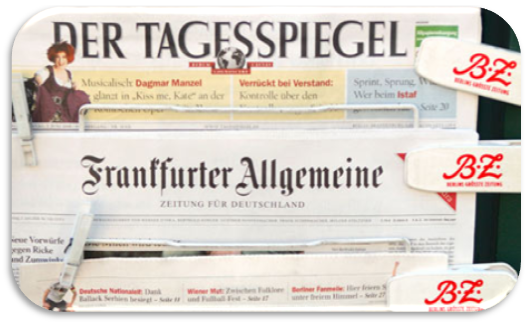Published: 2 March 2012
Region: Germany
Following our earlier report on women demanding equality in the German press Ines Pohl, a Berlin daily newspaper journalist, explains why even progressive daily newspapers need to do better.

Click here to read the piece on The Guardian website
In an open letter sent to 250 editors and publishers this week, hundreds of female journalists in Germany called for a quota to ensure that at least 30% of executive positions are filled by women. I was one of the signatories of the letter. You might think that newspapers don’t need quotas for female journalists, especially a leftist alternative publication such as Taz, the Berlin-based daily I work for. You might think that it should be fairly self-evident that men and women are treated equally at an outlet that has been actively feminist from its early days.
You’d be wrong, though. It’s often precisely in institutions and companies with seemingly level playing fields that men are able to settle in all the key positions: the less hierarchy and formal structure, the more open space for big egos. And even today that tends to be men with strong social networks, and not women, who often prefer to centre debates around subjects rather than themselves and their own interests.
At my newspaper, it took a strike by female employees to force through a quota. That was 25 years ago: today, few of the people in our office would doubt that this solution works out well for everyone. It helps women because it guarantees that their perspective, their expectations and individual problems are given due consideration. And it’s a plus for most of the men, too, that the work culture of our newspaper is now shaped by both sexes: even more introvert men now get a word in.
I don’t deny that the quota sometimes forces me as editor to take some time to search for the right female candidate for a post, when there might be more obvious male contenders. It can be exhausting to work on female colleagues to encourage and build them up until they have enough self-belief to take the next step on the career ladder. Especially when it comes to leading positions in a newspaper, men are often quicker to put their hand up and say: “Yes, I will,” and “Yes, I can.” In that sense a quota is even important for a feminist like me.
I hope it won’t take another strike to boost the embarrassingly small number of female bosses in German media companies. My co-signatories and I hope that our open letter has been a wake-up call that will encourage our colleagues to rethink their entrenched positions. And if we have the courage to change things, perhaps other countries, including Britain, will be inspired to introduce a female quota too.